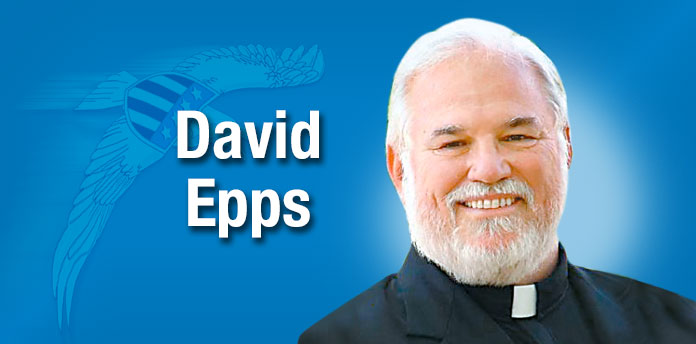I had a couple of interesting inquiries in the last few weeks. With many employers now requiring the Covid-19 vaccination as a requirement for employment or continued employment, there seems to be an interest in waivers.
As I understand it, there are at least two types of waivers: (1) a waiver for health reasons which must be obtained from a physician, and (2) a religious waiver which is to be obtained by a leader in one’s faith community. The request that came to me was for a religious waiver.
It is true that there are exceptions to the rules for religious reasons and the root goes at least all the way back to the New Testament where the authorities ordered the apostles not to teach or speak in the name of Jesus. The response of these church leaders was, “But Peter and the apostles answered, ‘We must obey God rather than men.’” (Acts 5:29) Thus, at a very early stage. the church entered the realm of civil disobedience.
Certainly, the Church has recognized that certain types of civil disobedience may be biblically valid. In the 1960s the peaceful demonstrations and marches for civil rights swept across the country resulting in massive arrests and, sometimes, injuries to the protesters. Later, pro-life advocates would stage non-violent protests at abortion clinics and in the state capitals which, again, resulted in the authorities arresting many and inflicting injury on some.
In both cases, the police often criminally charged and incarcerated the marchers, usually with misdemeanors. These are seen as crimes of conscience, as in, “We must obey God rather than men.” Today, those actions are seen as a person’s right to assemble and the right to free speech. This does not cover, however, criminal acts of violence, looting, arson, assault, or murder, which will rightly send people to prison.
Religious waivers are often given to certain religious groups because of their teachings. I remember in the first grade when there was a fellow student who wouldn’t stand for, nor pledge, allegiance to the American flag. The teacher explained that he was a Jehovah’s Witness and, thus, was exempt from participation in this activity.
There are also “peace churches.” Peace churches are Christian denominations explicitly advocating pacifism. The term “historic peace churches” refers specifically to three church traditions: the Church of the Brethren, the Mennonites (and other Anabaptists, such as the Amish and Hutterites), as well as the Quakers (Religious Society of Friends).
During the Vietnam War, many applied for conscientious objector status and sought to evade the military draft. Some were successful as they belonged to faith communities that were opposed to war — all war for any reason.
Not all conscientious objectors are opposed to military service, just the idea of killing another human being. Many conscientious objectors have served as medics and three, Desmond Doss, a Seventh Day Adventist (World War II), and Thomas W. Bennett and Joseph G. LaPoint (both Baptists and both in Vietnam) were awarded the Medal of Honor for heroism above and beyond the call of duty.
Generally, however, the conscientious objection must apply to all warfare and not just to one war. In other words, in the case of Vietnam, one would not normally receive a waiver, as it were, if one was only opposed to the one war and not to the others. A denomination may support both those individuals who serve in the military and those who are conscientious objectors, as long as both hold moral convictions.
So, what does all this have to do with issuing religious waivers for vaccines? Some people are, by conscience, opposed to all vaccines. They might be able to claim a religious waiver. Some might be opposed to certain vaccines because they contain fetal cells obtained from aborted babies. This, too, might qualify for a religious waiver, if the one resisting the vaccine is also morally opposed to abortions.
It is my understanding that the Johnson & Johnson coronavirus vaccine was developed with fetal cells. I personally would not receive that vaccine. It is also my understanding that the Pfizer and Moderna vaccines do not. My wife received the Pfizer, and I received the Moderna.
Unless one is morally opposed to all vaccines, I cannot issue a religious waiver for the Covid-19 vaccine, especially since there is a choice of vaccines. I am not opposed to vaccines, and neither is my denomination. In any event, I would not issue a waiver to anyone for anything if they were outside of our own faith community. That would not be my place to do so.
The Church, as previously stated, generally recognizes the right — perhaps even the duty — to civilly dissent and to exercise civil disobedience on matters of morality and biblical teachings. However, those who do must be aware of and prepared to pay the price of such dissent. That price might be fines, imprisonment, loss of job, or some other consequence. If, like the Apostles, one feels strongly enough, one will pay the price.
[David Epps is the Rector of the Cathedral of Christ the King (www.ctk.life). During the pandemic, the church is open at 10:00 a.m. on Sundays but is also live streaming at www.ctk.life. He is the bishop of the Diocese of the Mid-South (www.midsouthdiocese.life) He may contacted at [email protected].]













Leave a Comment
You must be logged in to post a comment.